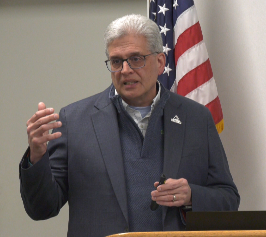By Brendan Scanland
WASHINGTON, D.C. — President Trump’s tariffs could be paying off — at least when it comes to federal deficits.
The nonpartisan Congressional Budget Office (CBO) says the president’s tariffs are on track to reshape America’s finances over the next decade. The Trump administration is pointing to the new projections as a win for the economy.
The CBO projects that President Trump’s tariffs could slash federal deficits by $4 trillion over the next decade. That’s $3.3 trillion from reduced primary deficits, plus another $700 billion from lower interest payments on federal borrowing.
The report suggests the tariff dollars could partially offset deficits from the One Big Beautiful Bill Act, which is expected to raise deficits by $3.3 trillion, according to an earlier CBO analysis.
“So generally these two things offset each other and it looks like, possibly the One Big Beautiful Bill and the additional spending there or tax reductions there, that deficit impact is going to be reduced,” said Curt Hopkins, CEO of MCQMarkets.com.
The CBO points to an 18 percentage point rise in effective tariff rates compared to last year. Imports from China, Mexico, Canada, the EU and goods like steel and autos are all targeted — bringing in record revenue.
On Friday alone, the U.S. collected $22 billion in tariff payments from importers. That pushed August’s total to nearly $30 billion, already higher than July’s record haul. Friday’s surge is largely attributed to a deferred payment system that gives importers until the fifteenth business day to submit payment for goods received the prior month.
However, experts warn the tariff revenues will likely come at a cost to American companies and consumers.
“Well, tariffs raise the price,” said Donna Ginther, the Roy A. Roberts and Regents Distinguished Professor of Economics and director of the Institute for Policy and Social Research at the University of Kansas. “They raise the price of consumer goods and they raise the price of inputs into manufacturing and so costs will go up. Those costs are passed on to the people who purchase the goods.”
“It’s just a question of who’s going to bear that cost. Is it going to be American businesses or American consumers,” said Hopkins. “These additional taxes or tariffs have to be paid by somebody. They’re typically paid by the importer. That importer may decide to get the exporter to pay for part of it, which is unlikely. They may try to eat some of that cost or they may pass it on to the consumer. The one thing I could tell you, unfortunately, it’s not going to be the foreign governments that bear the cost. Typically, it’s going to be the people that are spending to buy those products,” he added.
There is also uncertainty surrounding the legality of the president’s tariffs, which have been imposed using special presidential emergency powers — some call it a tariff time bomb.
“These tariffs may be ruled illegal,” said Hopkins. “The Constitution gives Congress the power to tariff, not the presidency.”
Tariffs on Indian goods doubled Wednesday to 50%. It’s a direct result of President Trump’s promise to punish countries that purchase Russian oil.
A special duty-free exemption for goods under $800 — basically a small package exemption — is set to expire on Friday.









